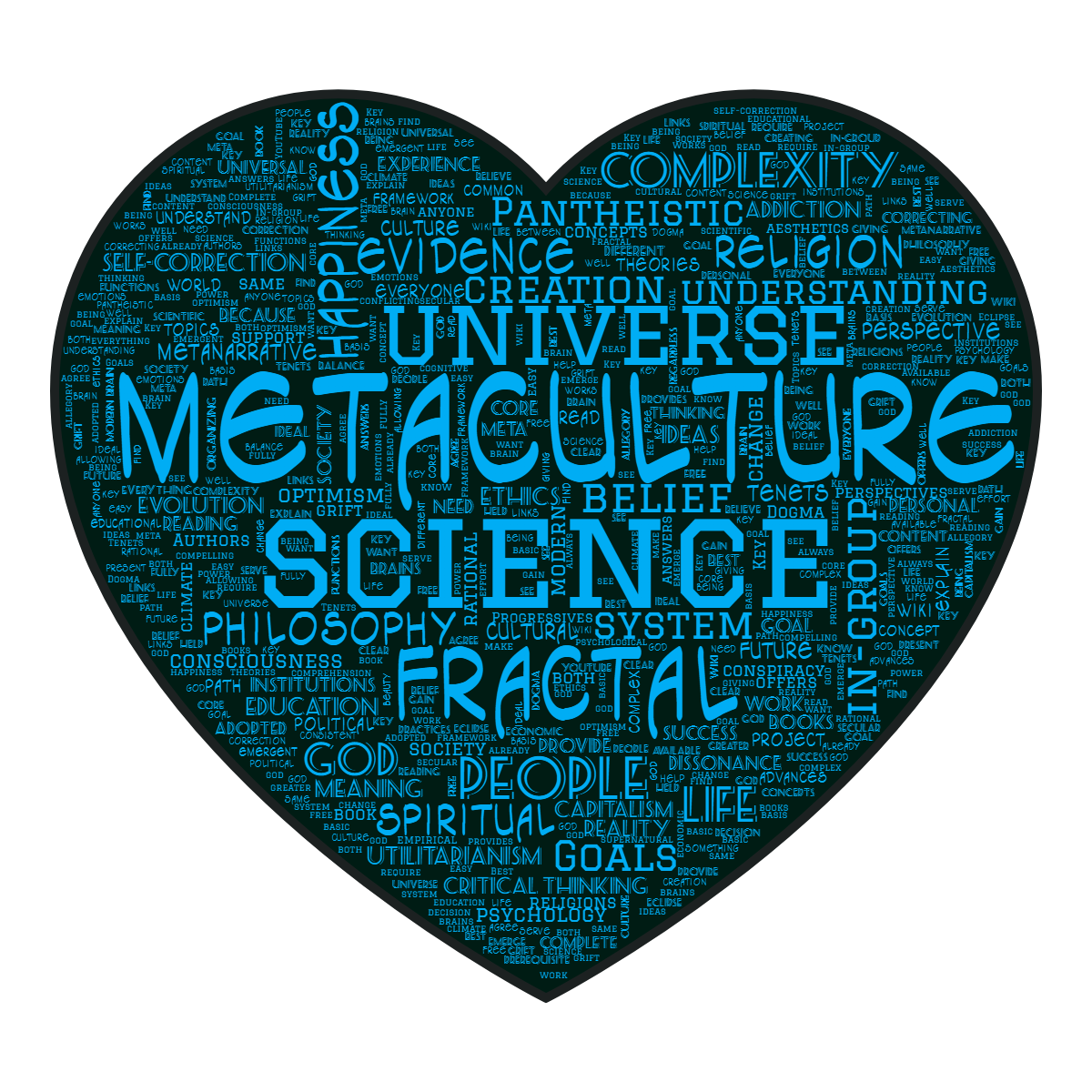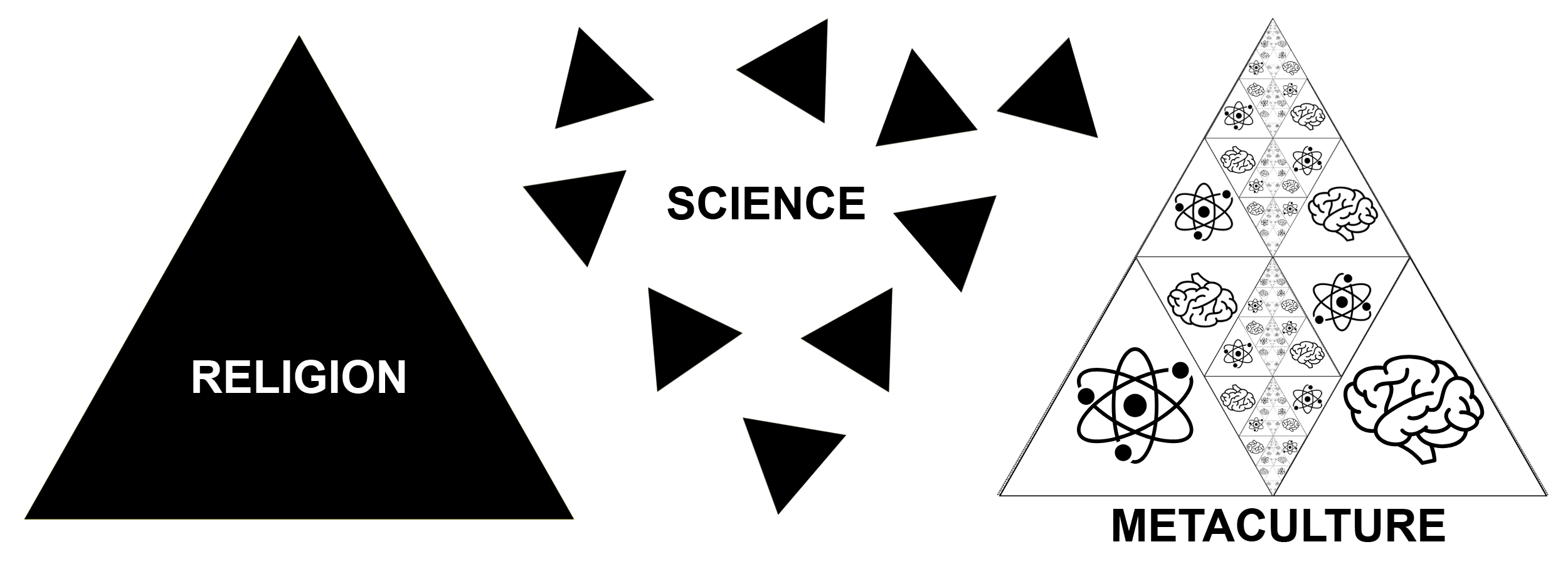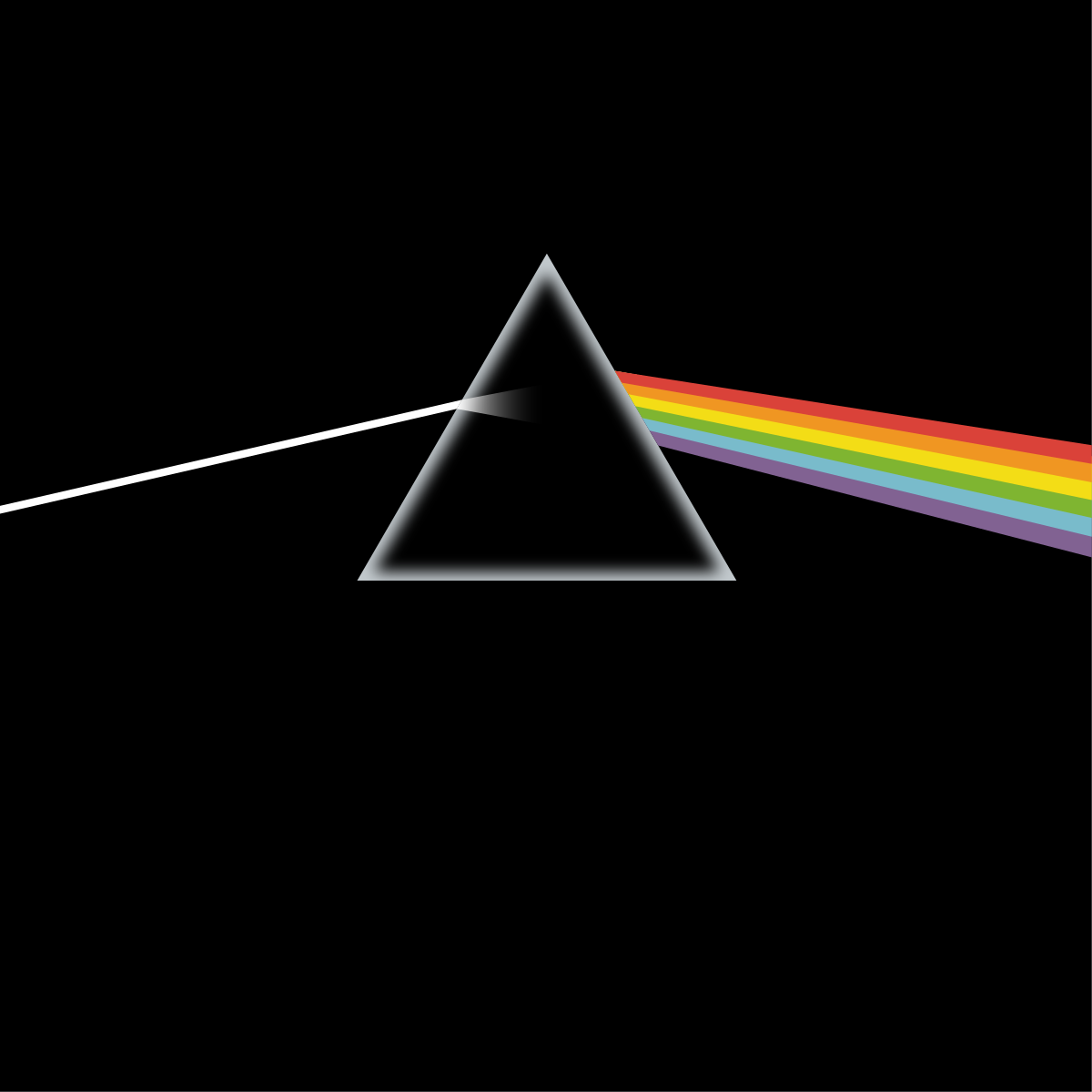Main Page

Think of a basic science education as giving you the pieces to the puzzle of the universe. All the facts are there, but nobody tells you how to put them together to create a meaningful worldview.
Those who claim to know always end up basing them on pseudoscience, conspiracy theories, supernatural stories, or scams that are incentivized by modern capitalism.
There's got to be a better way!
metaculture is like the picture on the puzzle box of the scientific universe, and it is a fractal.
Key Pages and Topics
metaculture uses the latest scientific theories in cosmology, complexity, evolution, sociology, and neuroscience, to create a new metanarrative of optimism, inclusivity, and universal love that is both spiritually satisfying and fully compatible with materialism by cultivating positive primal world beliefs.
The metaculture wiki is designed to provide all of the information you need to understand this way of thinking, using a wide variety of experts, authors, and content creators as source material. It is the ultimate guide to understanding the forces that are shaping modern society, and finding happiness despite them.
- Goals | Table of Contents | Pages by Topic
- Science | Fractals | Spirituality | Psychology | Ethics | Society | Best Practices
- Authors | Books | Podcasts | Organizations
- Substack | Bluesky
- NaNoCon Presentation: Anti-Humanism and the Rise of the Secular Gurus - Slides

It's Like a Book With Links and Videos
This wiki is intended to be read like a Choose Your Own Adventure book, not skimmed like a clickbait article on social media. To get the most out of it, you will need to recall the days of having an attention span [1][2][3]. When people sat down to read books with big ideas that couldn't be summarized in 140 characters. The wiki format allows for a much richer multimedia experience than what is possible with a book.
It summarizes the latest ideas from metamodern philosophy, complexity theory, and neuroscience, and makes them accessible to anyone with an undergraduate reading level.
It makes them more meaningful and easier to understand by tying them to a holistic metanarrative that connects all of these ideas to overarching themes like fractals, happiness, and the universal in-group.
Every link takes you to a new page with a wealth of information on that subject, and occasionally an Easter egg. The experience is better on a computer than a phone or tablet, since you can hover the mouse over links to see a preview.
Or just use the random page link and see where you end up.
When in doubt, follow the links! Keep going until they all turn purple!
Why Create This?
In his critique of Jordan Peterson, Nathan J. Robinson perfectly sums up the need for a project like this wiki:

"[B]ecause academia and the left have failed spectacularly at helping make the world intelligible to ordinary people, and giving them a clear and compelling political vision."
Progressives, scientists, and secular people must present a clear and compelling vision for how the universe works that can compete with the shortcut philosophies and easy answers peddled by spiritual gurus and political grifters. But postmodern aversion to metanarrative has hampered these efforts.
The world is also complex. It can't be boiled down to a sound bite, tweet, or even a single book. Progressives have struggled to explain policies based on expertise and evidence that require more than a "common sense" understanding of the issues. Marketing is not enough to persuade people, it will require education. The wiki can provide an open-source, collaborative platform to create such a free educational resource.
A secondary reason to create this wiki is that the authors find it fun, interesting, and cathartic, and would do this even if nobody ever read it. One could say there is an uncontrollable urge to do so, and Sapolsky would agree. But hopefully you will read it and find it both enlightening and entertaining!
Who is This For?
The metaculture wiki is for all the people disillusioned with organized religion, politics, capitalism, technology, and all of the other institutions of modernity that appear to be in a confederacy against our happiness and ability to thrive as natural humans.

It is for all of the progressives who yearn for a social safety net that will use the incredible wealth of our society to protect people from the abuses of capitalism and reestablish the balance of power between workers and owners. Surely the vast majority will support evidence-based policy if they can just see through the propaganda that pervades our media. You know that the people who stand in opposition to progress use religion as the basis for their decision-making. How can they ever change their minds about climate change without changing their literal view of scripture?

It's also for those who know that their spiritual beliefs should agree with science and evidence. Those who are eager to learn the fascinating new theories in physics that explain creation and evolution, as well as those in psychology that explain our values, ethics, and emotions, help us understand ourselves better, and make better life choices.
It is for all young men who are being led by the pied pipers of the manosphere toward the right-wing faux-philosophy of Jordan Peterson. If you are searching for meaning and a belief system that will help you become a better person and eventually meet a woman—is misogyny really what you think they want? The majority of women are progressive. Do the basic math. Real men are realists, and metaculture is a viable, reality-based alternative to the manosphere.
This is for anyone who recognizes and resents those who peddle belief systems catering to the disaffected and offer conspiracy theories in place of analysis; scams instead of solutions; spiritual grifters who use quantum woo to sell supplements and seminars to people whose symptoms are a condition of modern life, and cannot be cured without doing the work of organizing for social change that conspiracy theories distract them from.
metaculture offers something for everyone, providing a path to reconciliation, optimism, and hope for the future, regardless of where you are starting from. It is a manifesto for the reasonable!
The Goals of metaculture

If one statement can summarize the goal of the metaculture project, it would be:
Improving the subjective experience of consciousness
Evidence shows that rational optimism is the best path to happiness, and this wiki provides a roadmap for adopting that perspective.
It does this by describing the emergent properties of a universal meta-belief system based on empirical knowledge of our universe, our minds, and humanity's shared culture. This enables the translation of spiritual wisdom from diverse cultures into the universal language of science, allowing us to understand ourselves and each other much better than we ever have. This should make the experience of living on Earth a little nicer for everyone.
It is emergent because it represents a cultural attractor that arises from a robust, up-to-date science, philosophy, psychology, and liberal arts education that provides all of the prerequisite concepts required for rational comprehension of the universe and human consciousness.
It is meta because it transcends and includes existing religions and ideologies to provide a framework for cross-cultural understanding in a globalized society.
A number of modern authors and podcasts are helping to popularize this way of thinking that seamlessly incorporates evidence-based ethics and rituals (meditation, gratitude, forgiveness, etc.) that create meaning in the context of modern, secular life, without the supernatural baggage that traditional religion requires.
The goal of this wiki project is to describe this emergent meta-belief system and provide concise summaries and links to free educational resources that allow you to learn all the necessary prerequisite concepts needed to fully comprehend it.
Philosophical Goals
When fully developed, metaculture should provide:
- A mental framework for rational comprehension of how the universe and our brains work.
- A culturally neutral moral philosophy, updated for the future.
- An evidence-based, self-correcting socioeconomic and political philosophy.
- A viable path towards the creation of a universal in-group.
- A readable, interactive Wikipedia that teaches these concepts with a unified metanarrative.
Any improvement to the ideas, perspectives, or rhetoric that better advances these philosophical goals should be adopted.
Social Goals
By providing an easy way for anyone to gain all the prerequisite knowledge needed to come to this understanding, the following goals for society should be advanced:
- Promote the principles of science, reason, and critical thinking.
- Use Evidence-Based Best Practices as the basis for political and personal decision-making.
- Change primary meterstick for success from money/GDP to utilitarian happiness/GNH.
- Integrate art, music, poetry, creativity, games, and aesthetics in education and daily life.
- Reduce cognitive dissonance brought on by conflicting interpretations of science and religion.
- Update our culture's ethics and social norms to deal with capitalism and future technology.
- Increase the incentives for economic and social justice and restore the balance of power.
- Expand political, personal, religious, and economic freedom.
- Oppose pseudoscience and the grift economy and undermine it with awareness.
- Increase the trust in institutions that is required for democracy to function.
- Catalyze the transition to secular institutions that can serve our cultural and psychological needs without the supernatural kayfabe.
- Preserve nature and the environment, avert climate change, and other apocalypse scenarios.
- Effect world peace, unity, and and end to all war (if there's time).
Any improvement to the ideas, perspectives, or rhetoric that better advances these social goals should be adopted.
Accomplishing these goals will require sustained effort over multiple generations. However, once a tipping point is reached, the new pattern will rapidly emerge.
A New Kind of Metanarrative
metaculture is not a replacement for any rational, universalist belief system you already hold that works for you. It is a new perspective on these common ideas that covers all philosophical bases from a holistic point of view, tries to appeal to a variety of modern cultural perspectives, and offers new ways of presenting the ideas to fill in the gaps of modern education that keep others from coming to the same understanding.
For many, it's just the thing you already believe, with more detail, and a symbolic fractal theme that ties together all the ideas into a single, unifying concept. It is a way to unite different people of the world who believe the same thing in different ways.
"It's like reading a more articulate and detailed version of how I view reality." --Satisfied Reader
Whether you come from a theistic or atheistic perspective, metaculture offers a path to reconcile the cognitive dissonance that conflicting scientific and spiritual modes of thought can cause.

It should work side-by-side with any religious or humanist tradition you practice, allowing greater understanding of science, spirituality, and other cultures without replacing your own. It's metaculture, not monoculture.
A thorough reading should serve as an inoculation against scriptural literalism and authoritarian ideologies, and a booster for critical thinking. It offers something for everyone.
The Happiest YouTube Rabbit Hole
Each page of the wiki introduces a key concept, and has curated, high-quality educational videos that explain them in easy-to-understand terms, and funky music that helps you interpret them through dance. They present an optimistic perspective on science, religion, and psychology that focuses on wonder, meaning, and increased personal and cultural happiness.
It's an analytical yet lighthearted take on some heavy science and philosophy. Like "Peter Explains the Cosmic Joke."
Watching the videos on this wiki will work wonders for your YouTube algorithm and will never lead you down a conspiracy theory rabbit hole!
Core Tenets

metaculture is a complete, unified philosophical and theological system that addresses major questions of ethics, epistemology, metaphysics, aesthetics, etc., that philosophers, scientists, and religions have always dealt with.
metaculture fills a vital need to present a culturally neutral belief system that fulfills the same need for certainty offered by religions, scam artists, and right-wing ideologues. By putting science and self-correction as its core value, it avoids the pitfalls of both relativism and dogma.
The goal is not to rewrite these works but to combine the best of them in a way that creates a framework for a simple, universally applicable metanarrative that is consistent with both science and scripture and can be understood regardless of one's education level or cultural background.
The core tenets are:
- Scientific Realism: that an objective reality exists and advances in science improve the accuracy of our understanding of that reality. The metaphysical, ontological and epistemological assumptions of metaculture are the same as those that underlie a modern understanding of Scientific Realism that accounts for the biases, power structures, paradigms, and other social factors highlighted by Thomas Kuhn and Jacques Derrida.
- Utilitarianism: that the success of our ethics can be measured and improved based on the impact it has on human emotions. Furthermore, the assumed goal of utilitarianism (happiness and well-being) can be derived empirically from the principles of neuroscience.
- Fractal Aesthetics: that our sense of beauty derives from our evolved mental representations of the universe, and because the universe is inherently self-similar, complex and symmetrical, we find beauty in that which exemplifies these things. The fractal is also the symbolism of metaculture.
- Pantheistic Universalism: that the concept of god is common to all religions because it is an allegory for the universe we all exist in, as well as a self-organizing pattern in the brain.
- That any principle described herein, including these core tenets, is subject to future revision should empirical evidence contradict it. The Dogma of No Dogma.
- Should another parallel effort better succeed in fulfilling the goals of metaculture, our resources should be dedicated to support the project with a greater chance of success.
metaculture allows anyone to quickly gain a robust, consistent, accurate, and self-correcting understanding of how our universe, brains, and societies work. It uses science to provide direct and satisfactory answers to life's biggest questions, without reliance on supernatural stories or forcing you to figure it all out for yourself.
metaculture should convey all the psychological and sociological benefits traditionally ascribed to religion, including social cohesion, psychological support, personal meaning, positive social change, a good creation story, and psychologically satisfying answers to the ultimate question of life, the universe, and everything.[4]
Table of Contents

Since this is a book in wiki format, you will need to follow the links to find most of the information it contains. These are just some starting points.
It is designed to be read not linearly but systematically, following links as you follow your interests, until you rarely see an unread link. Some pages will be visited multiple times, since they serve as a nexus for many related concepts. The connections and patterns that emerge from this process are the main persuasive argument made by this wiki.
Keep in mind that one of the main goals is to bridge the divide between science and religion. Atheists may object to the use of religious allegory, and theists may object to the materialistic metaphysics. Both are encouraged to read with reconciliation in mind. If you want to help the other side understand your perspective, what is the most persuasive way to do it?
Reference Material
The nice thing about evidence-based philosophy is that most books tend to support your point of view.
- The Reading List is a selection of books that, if you fed them all to a large language model AI, would produce something similar to this wiki.
- The Authors page lists a number of modern writers who advocate different aspects of this perspective and continue to push the conversation forward.
- Check out the Podcast page for online content producers.
- A list of Organizations that promote the social and philosophical goals advocated in this wiki.
- The Webinar Series breaks down the wiki by topic, and will include recorded presentations and Q&A sessions once they are available.
- You can also just go to a Random Page and take it from there!
Key Topics
- The Fractal Universe
- The Science of Psychology
- The Experience of Psychedelics
- The Functions of Religion
- Betting on Reality
- A Metanarrative of Everything
- Metaphor Mapping
- The Pantheistic, Universalist Definition of God
- The Scientific Creation Story
- The Scientific Afterlife, Heaven and Hell
- Consciousness, Free Will, Neural Networks, and the Brain
- Addiction, Salience, Variety, and Moderation
- Maximizing Happiness is Objectively the Meaning of Life
- Creating Reflexive Happiness with Optimism
- Utilitarianism, Consequences, and Empirical Ethics
- Quality of Life versus Quantity of Life
- A Utopia of Self-Correction and Progress
- Economics and Capitalism
- Society, Institutions, Politics, and Justice
- Best Practices for creating a Culture of Happiness
- The Importance of Persuasion
Complete Index of Pages

Table of Contents, set to the lyrics of Eclipse
- All that you touch
- All that you see
- All that you taste
- All you feel.
- All that you love
- All that you hate
- All you distrust
- All you save.
- All that you give
- All that you deal
- All that you buy,
- beg, borrow or steal.
- All you create
- All you destroy
- All that you do
- All that you say.
- All that you eat
- everyone you meet
- All that you slight
- everyone you fight.
- All that is now
- All that is gone
- All that's to come
- and everything under the sun.
Like Easter eggs? Find all of the tracks on Dark Side of the Moon and collect your achievement!